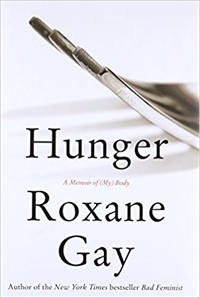 Roxane Gay, Hunger: A Memoir of (My) Body (New York: HarperCollins, 2017), 306pp.
Roxane Gay, Hunger: A Memoir of (My) Body (New York: HarperCollins, 2017), 306pp.
This memoir by the feminist Roxane Gay doesn't offer any happy ending or hidden insights, but what it does do is tell a painful story that is shorn of all pretense and pretending. "I've cut myself wide open," writes Gay, "I am exposed. These are the ugliest, weakest, barest parts of me." Gay brings a rich mix of gifts to her task: psychological self-awareness born of years of hard work, a nuanced emotional vocabulary, fearless vulnerability, brutal honesty, and remarkable writing skills.
Those who are familiar with Gay's high profile media presence know that she is first of all fat. Very fat. Not just obese, or even morbidly obese, but what is called "super morbidly obese." At her heaviest, Gay's 6' 3" body weighed 577 pounds, what she calls a "staggering" and "unfathomable" number. How and why she got to this point, its costs and consequences, are what drive her story. As if fat shaming is not enough to bear, Gay also relates the trauma of being gang raped at the age of twelve. Mixed together, those two have made for a very toxic brew.
Contradictions abound. Despite her size, she is "invisible" in a culture that idolizes thinness. Sometimes her invisibility means protection and safety, but at other times it signals being ignored, dismissed, and derided. Sometimes Gay wants to disappear and be ignored, at other times she begs to be known. No one wants to be defined by the worst thing they ever experienced, and so stereotyped, but on the other hand that is the salient part of her story. Her past is over, but it's very much a continual presence, and always will be. She bears her own responsibilities, but has endured experiences beyond her control.
Gay's story also functions as a masterful piece of cultural criticism on fat phobia and sexual violence. There are riffs here on bulimia, tattoos, weight loss "reality" television, weight loss camps, every sort of diet you can imagine, therapy, smoking, sleep problems, personal trainers, and her own self-loathing that's exacerbated by our toxic cultural narratives about body image.
The genius of Gay's private story is that it is nonetheless universal. We all have a deeply human need to receive and to give unconditional love. We all want to be accepted for our unedited selves, to stop playing a role and to inhabit our true identity. And we are all called to love others who are different from us, without making accusations and assumptions about them. Truly, you never know what a fellow human being might have experienced. Still, as Gay says at the end of her book, "It's scary trying to be yourself and hoping yourself is enough. It's scary believing that you, as you are, could ever be enough."


